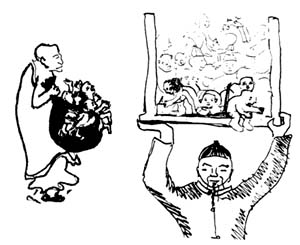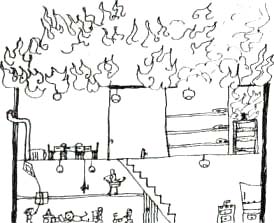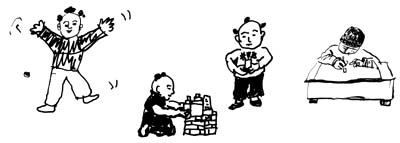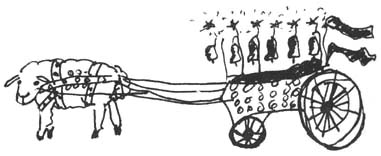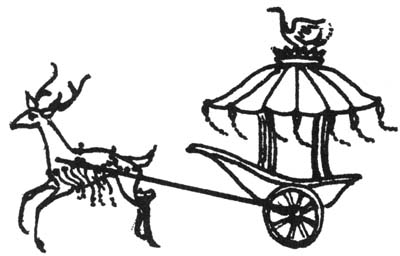|
Commentary:
Sakyamuni Buddha
calls out again to Sariputra saying, the Elder then reflects/ This is in
reference to the time when, for twenty-one days, the Buddha thought about what
dharma he should speak that would be best suited to waking up living beings
from their dreams.
"I have a strong body
and arms"/The Buddha is speaking about himself. The body represents the
Buddha's spiritual penetrations, which are ineffably wonderful. The arms
represent the Buddha's wisdom, which raises up living beings.
The Buddha's spiritual penetrations
conquer the karmic force, which bears down heavily upon all living beings,
carrying the load of their karmic burdens. The Buddha uses his wisdom to teach
living beings gradually and to lead them to understanding. This wisdom is manifest
from samadhi. The samadhi is the Buddha's virtue of severing as discussed
previously. When the Buddha says he is going to sever something, he does
it. He's not like us. We talk about getting
rid of our faults, but don't get rid of them. Then we have to undergo the
consequences. With the virtue of severing, the Buddha can discriminate the
Real Mark of all dharmas.
The Buddha also has the virtue of wisdom.
With this wisdom he speaks the Dharma. In speaking the Dharma, the Buddha uses
both the virtue of severing and the virtue of wisdom. Thus, he accomplishes the
Dharma body.
To enter the two qualities of the virtue
of severing and the virtue of wisdom, you must do so by means of the two doors
of exhortation and admonishment. Exhortation means to encourage people to do
something. To admonish is to warn people not to do something. These two doors
can be related to the Four Types of Complete Giving, which are:
1. Complete giving for the sake of the person.
2. Complete giving in order to cure.
3. Complete giving which is mundane.
4. Complete giving of the primary principle.
The door of exhortation is
the first, the complete giving for the sake of the person. The door of
admonishment is the second, the complete giving in order to cure.
Basically, there is nothing
to say about the Buddhadharma. That which is spoken is only superficial.
Previously, I said,
In the non-dual Dharma-door
one doesn't open one's mouth.
In the ground of the
primary principle, there are basically no words.
What is the ground of the
primary principle? There is also nothing one can say about it.
If the Dharma cannot be
spoken, then why do we speak the Dharma? Why did Sakyamuni Buddha speak the
Dharma?
His speaking of the Dharma
was based upon the Four Types of Complete Giving. "Complete" here
means universally pervading. One universally gives with the four types of
complete giving.
The exhortation door
belongs to the complete giving for the sake of the person. The admonishment
door belongs to the complete giving to effect a cure. "For the sake of the
person" means to speak the Dharma for living beings. "To effect a
cure," means to speak the Dharma to counteract the bad habits and faults of
living
beings. These two types of complete giving are spoken for the sake of the
complete giving of the primary principle. The complete giving which is mundane
is also spoken for the sake of the primary principle. They are set forth as
preliminary expedient dharmas.
Therefore, when the Buddha
first spoke the Dharma, he spoke the exhortation door to cause all living
beings to offer up all good deeds. They must do all kinds of good things.
And what is the use of
doing good deeds?
What advantages does it
have? A lot of them;
In general, it enables you to accomplish the Ten
Powers of the Thus Come One.
By means of the exhortation
door one also accomplishes the Four Fearlessnesses of the Buddha:
1. The fearlessness of all
wisdom.
2. The fearlessness of
speaking Dharma. When the Buddha speaks the Dharma it is like the roar of the
lion which terrifies all the wild beasts. The heavenly demons and those of
external
religions all come and take refuge.
3. The fearlessness of
speaking about dharmas which obstruct the Way. The Buddha teaches which
dharmas obstruct the Way and which do not, discriminating the Real Mark of all dharmas,
causing living beings to wake up.
4. The fearlessness of
speaking of the dharmas which lead to the end of the path of suffering.
If we rely upon the
exhortation door spoken by the Buddha and offer up all good deeds we, too, can
obtain the wisdom of all modes. However, living beings have bad tempers and if
you teach them to do good things, they won't necessarily do them. If you teach
them to do evil things, they do them right away.
Since living beings are
unable to accept the exhortation door, the Buddha teaches them using the
admonishment door. He says, "Hey! Don't you dare do that!" giving
them a loud and stern warning just like parents teaching their children not to
do improper things. "DO NO EVIL! You are not permitted to do any evil
deeds! Since it did not work before when I taught you to do good things, I am
now forbidding you to do anything evil." Strange, living beings have a
habit of doing the evil things you don't permit them to do. If you teach them
to do good things, they won't do them. Living beings have habits, which are too
deeply ingrained for even the Buddha to do anything about. They deliberately
insist on doing an evil deed just to try it out, just to see what trouble it
brings. They try it out and try it out until eventually they fall. If you tell
people to do no evil, they insist on doing it. If you teach them to do good,
they refuse. The Buddha thinks, "They are so disobedient, then I will not
teach living beings!" and he wants to quit teaching them. "Hah!"
What is the advantage of
doing no evil? You can certify to the great Nirvana, to its four virtues of
permanence, bliss, true self, and purity. But, living beings insist upon doing
evil and are unable to accept the admonishment door. The Buddha tried the
exhortation door, but they didn't listen. Since there were no teachable living
beings, the Buddha decided to take a rest and not teach and transform living
beings. But then again, if he did not teach living beings, the Buddha would
have nothing to do, and he would feel compelled by his idleness to find
himself a job. So he thought he would try speaking the Great Vehicle Dharma,
teaching by means of spiritual powers and wisdom.
Adorned with the power of
samadhi and wisdom,
With these one saves living
beings.
Previously, when praising
the Elder, it was said that he was advanced in years. This represents the
virtue of wisdom and the virtue of severing. These two virtues are also
represented
by the phrase "a strong body and arms."
"I might gather them
in a cloth pouch"/In India cloth sacks were used to carry flowers. The
cloth pouch represents the Buddha's knowledge and vision. The cloth pouch,
although
one thing can contain many things. It represents that the Buddha's knowledge
and vision, although a simple thing in itself can contain the knowledge and
vision of all living beings within it. Knowledge refers to the wisdom of all
modes. Vision refers to the Buddha eye. The wisdom of all modes means that
there is nothing the Buddha does not know. The Buddha eye means that there is
nothing the Buddha does not see. Using his knowledge and vision, the Buddha can
rescue all living beings from the revolving wheel of the six paths of rebirth.
"Or on a
table."/The Chinese text gives two characters, the first of which is
( ), chi,
a small table. The second is( ), chi,
a small table. The second is( ), an, a large table. Here in the lecture hall we
have put several small tables together to make a large table. The small tables
represent the Four Fearlessnesses, which are used to teach and transform
living beings so that they may escape from the suffering in the Three Realms
and avoid the difficulties in the six paths. The small table represents the
Four Fearlessnesses, but this dharma is comparatively small, not broad and
expansive. The large table represents the Ten Wisdom Powers of the Buddha. ), an, a large table. Here in the lecture hall we
have put several small tables together to make a large table. The small tables
represent the Four Fearlessnesses, which are used to teach and transform
living beings so that they may escape from the suffering in the Three Realms
and avoid the difficulties in the six paths. The small table represents the
Four Fearlessnesses, but this dharma is comparatively small, not broad and
expansive. The large table represents the Ten Wisdom Powers of the Buddha.
In hearing the Dharma, you
shouldn't be afraid of hearing it spoken once, twice, three, four, or even five
times. Why? Once it is heard it has "walked through" your eighth consciousness
and planted a vajra seed. Do not think that once you hear a dharma you need not
hear it again. The Dharma is like our food and drink. If you eat today does
that mean you won't have to eat tomorrow? No. You have to eat every day. After
you eat, you wait a while and then you get hungry again and eat again. Hearing
the Buddhadharma works the same way. You hear it once and then you hear it
again. Don't fear hearing it too many times. If you do, it means there's some
question about the wholesomeness of your roots. What question? The question of
retreating from the heart of Bodhi. It doesn't matter who is lecturing on the
Dharma, as long as there is a lecture, we should take time from our busy
schedules to go listen to the Dharma. You should think, "I listen to the
Dharma, and whether the lecture is good or not, I still am going to listen. If,
out of a hundred sentences, the speaker says only one thing that strikes a
responsive chord in me, a sentence that helps me get rid of my faults, then I
will not have listened in vain."
You should not think,
"His lecturing is meaningless. I'm not going to listen." When you
listen to the Dharma, first of all you plant your own vajra seeds, and secondly
you are supporting the Dharma Assembly and the Bodhimanda. You should look upon
the Bodhimanda as you look upon your own household. You should feel the same
responsibility for it. "I listen to the lectures everyday. I hear the
Dharma everyday. Everyday I take care of my household affairs and I also protect
the Bodhimanda."
The Buddha uses the Ten
Wisdom Powers to teach and transform living beings in the Six Paths of Rebirth
so that they may leave suffering and attain bliss. Previously the Four
Fearlessnesses represented by the small table was a relatively simple dharma.
The Ten Powers save beings both horizontally and vertically, and are more
expansive and inclusive.
For twenty-one days after
his enlightenment, the Buddha thought and pondered, "What dharma should I
use to teach and transform living beings? Should I use the great or the small
dharma?" He thought about it for twenty-one days and the dharmas he
decided to use are grouped under the exhortation door. The exhortation door is
a dharma which "gathers in." It gathers in living beings in the same
way a magnet attracts iron filings. Thus it belongs to the complete giving for
the sake of the person.
The admonishment door warns
us to do no evil and is a kind of suppressing Dharma. Since you didn't listen
to the exhortations, I'll scold you a good one; I'll use a strict method to
teach you. The exhortation door was a compassionate door. The admonishment door
was a severe door. Thus the Buddha used both the gathering and the suppressing
dharma to teach and transform living beings. The Four Fearlessnesses, the Ten
Powers, and the knowledge and vision of the Buddha were used to lead all living
beings from the burning house.
He further reflects,
"This
house is narrow and small and has only one door/What is the one door? It is the
One Buddha Vehicle, the door of the White Ox Cart, the Great Vehicle. It is a
very small door. Although it is the Great Vehicle, there are so many people to
come through it that it will certainly be too small.
The One Vehicle is
represented by the one door. You could also say the one door represents the
doctrine of the One Vehicle, the Purity of the One Way. What is the door? It
represents the proper teaching, the orthodox Buddhadharma. Further, a door is
something which people can go through. In the same way, the proper teaching
teaches and transforms living beings.
What is meant by
"narrow and small?" Externalist religions cannot go through this door
because they are attached to the concepts of permanence or annihilationism. The
living beings in the Seven Expedients are also unable to get through this
door. Only the Bodhisattvas of the Great Vehicle's Perfect Teaching are able to
go through this door. The Seven Expedients are made up of those with the
disposition
of the Small Vehicle and so they are not able to get through the door. That is
an explanation according to the Small Vehicle. Explained in terms of the
doctrine itself, this door is the largest door, for only the Buddhas and the
Bodhisattvas of the Perfect Teaching can go in and out of this door. Small
Vehicle people don't understand the perfectly interpenetrating doctrine of the
Great Vehicle. Although it is said to be a small and narrow door, it's not
really. It's the biggest. The Small Vehicle people neither understand nor
comprehend it, and so for them it is narrow and small.
The wonderful doctrine of
the One Buddha Vehicle is said to be the doctrine of uniformity because it is
not mixed with any other doctrines. Since the doctrine is one, the path is
especially pure. This pure path is the only path, and so it is said that there
is one door. Why is the door said to be small? Because the oneness of the
doctrine and the oneness of the Way are fine and subtle, inconceivable.
Inconceivable
means that it is difficult to understand. This is to speak of it in terms of
the theory.
To explain it in terms of
the teaching, it is the Perfect Teaching, the teaching in which the provisional
and real are non-dual. Ordinary people don't know how to get through the door,
they don't understand the provisional. They also don't know how to get in the
door, they don't understand the real. The provisional and the real, these two
teaching doctrines, are not understood by common people. Although those of the
Two Vehicles understand how to get out, they never understand how to get in.
Thus, they also don't understand this doctrine. Although the Bodhisattvas know
exactly how to get out, they also don't know how to get in. This refers to the
Bodhisattvas of the Special Teaching and below, the Bodhisattvas of the Seven
Expedients. The Seven Expedients don't understand this teaching doctrine, and
so the teaching of the One Buddha Vehicle is "narrow and small."
Since they are unable to travel it, for them the great becomes small and
narrow. This Dharma-door belongs only to the One Buddha Vehicle. So the door is
narrow and small and there is only the One Buddha Vehicle.
The one door is the Great
Vehicle's White Ox Cart door, which represents the One Buddha Vehicle. We have
explained the One Buddha Vehicle according to the teaching and according to
the theory. Now, we will explain it according to the conduct.
Conduct refers to the
cultivation of the Perfect Teaching. It is a direct conduct, not a crooked or
roundabout conduct, because nothing can obstruct it or block it up. Therefore,
the conduct is one. In cultivating the Bodhisattva Way, you go directly to the
position of Buddhahood, to the Bodhimanda, where you realize the Buddha Fruit.
It is a "door" because you go straight through it. However, walking
through the door is a kind of wonderful conduct, which is not easy to
cultivate. The Great Vehicle Buddhadharma is hard to cultivate. No expedient
Dharma-doors are used, and so the door is said to be narrow and small. In
reality, this Dharma-door is by no means narrow and small. It is the broadest
and greatest of doors.
My sons are young and
immature/The ten, twenty, or thirty sons mentioned previously, that is, those
of the Three Vehicles: Sound Hearers, Conditioned-Enlightened Ones, and
Bodhisattvas.
What is meant by
"young and immature?" Everyone knows that children are immature. They
have no sense and so they are not afraid or alarmed. Although during the time
of the twenty thousand Buddhas, those of the Three Vehicles have both studied
the unsurpassed Way and cultivated the Bodhisattva dharmas, and although they
have been both taught how to cultivate the Way and transformed by those twenty
thousand Buddhas, still their good roots are small and weak, and without
strength. Since their good roots are weak, they are young and immature. In the
Buddhadharma, those of the Three Vehicles are looked upon as little children.
And as yet know
nothing/Because their good roots are so scanty, when those of the Three
Vehicles hear the Great Vehicle Buddhadharma, they slander it as did those
arrogant five thousand people who walked out at the beginning of the speaking
of the Sutra. When they heard the Buddhadharma, they did not believe it. They
ran off because they "knew nothing." They had no common sense.
Attached to their place of
play/They are caught up in their place of play. Not only are they unable to
accept the Great Vehicle Buddhadharma, they also wish to retreat from their
resolve for Bodhi. Having retreated, where do they end up? Attached to love and
views! Having retreated from the Bodhi heart, they are harassed by the eight
kinds of suffering and become attached to the Dependent and the Proper
Retribution Worlds. The Dependent Retribution World refers to the mountains,
the rivers, and the earth and all the vegetation and buildings. The Proper
Retribution World is our bodies. The Proper Retribution World is also called the
material world. Having retreated from the Bodhi heart, they undergo the eight
sufferings and become attached to these two worlds. That is what happens to
ordinary people.
There are Three Realms: the
realm of desire, the realm of form, and the formless realm. Beings in the
realm of desire are attached to the five desires: wealth, sex, fame, food, and
sleep. The five desires may also be said to be form, sound, smells, tastes, and
tangible objects, that is, the objects of the five senses.
Beings in the realm of form
also have their attachments. They are attached to the flavor of Dhyana. Beings
in the four heavens of Dhyana are attached to the delight of Dhyana and the
bliss of the Dharma. All day long they are extremely happy, happy to the point
that you couldn't even describe their happiness. That is why the first Dhyana
is called the blissful ground of leaving production, the second is called the
blissful ground of the production of samadhi, the third is called the wondrous
ground of leaving bliss, and the fourth is called the pure ground of getting
rid of thought. The flavor of Dhyana is the taste of meditation. All of a
sudden these beings become attached to their happiness, like children who eat
one piece of candy and then want another and another. Those in the form heavens
are attached to the flavor of Dhyana.
Beings in the formless
realm have their attachments, too. They are attached to their samadhi. You
shouldn't think that hearing "precepts, samadhi, and wisdom" talked about
all day is all there is to it. If you get attached to your samadhi and are born
in a formless heaven, you will not be able to get out of the Three Realms.
But, let's not speak of the
beings in the desire, form, and formless realms—which of us has no attachments?
If we had no attachments, we could escape the Three Realms. A person might
basically be very intelligent but ends up doing all kinds of crazy things
because he is attached, caught up in his place of play. Today he runs south and
tomorrow he runs north; the next day he runs east and then he runs west. People
cannot put down their stupid behavior. They are all attached to their places
of play. Why? It's a lot of fun here; They are like people in a movie theatre
who forget all about their homes. Or they run off to gamble and forget to go
home, forget everything. You might say they have entered the gambling samadhi,
or the movie-samadhi, or the dancing samadhi. Crazy mixed-up antics! They are
attached to their places of play. And what happens then? The next sentence
lays it right on the line:
They may fall and be burnt
in the fire/Luckily the text says "may." It doesn't say for sure
that they will fall, and so there is still some hope. This means that if you
are able to reform yourself and become unattached, if you know to turn back
from the confused path, you may not fall. If you don't wake up, you will fall.
It's not fixed. This is like when a person has been arrested and has not yet
been convicted or sentenced. It could go either way.
Why might they fall?
Because they are young and immature, that is, stupid. Children have no sense.
They are very stupid. Likewise, attachment to the five desires, which causes
one to fall, is also very stupid. They fall because they are young and
immature, too young to understand things. They fall because they know nothing,
they simply don’t know any better. They take what is suffering as bliss and
turn their backs on enlightenment in order to unite with the dust. They go
against the doctrine of enlightenment and think the most painful things are
pleasurable. People like this fall into the three evil paths. Once they fall,
they will be burnt in the fire. What is the fire? The eight sufferings, the
five skandhas, and the five turbidities. Once burned, it will be even harder
for them to wake up.
Sutra:
|
